
An Initiative of the Ministry of
Endowments and Religious Affairs
Sultanate of Oman
Córdoba, since June 07, 2012
The Biblioteca Viva de al-Andalus (BVA - “Living Library of Andalusia”) was created in 2002 by the Fundación Paradigma Córdoba, whose essential purpose is to remember the key role of Córdoba in the 9th to 13th centuries, the cross-fertilization of cultures of the East (China, Indian, Arabic and Persian) and West (Greco -Roman and Judeo-Christian) and the symbiosis, in Al-Andalus, of the three Abrahamic religions: Jewish, Christian and Muslim.
The BVA houses meeting rooms, study center, and a collection of books and manuscripts pertaining to the history of Córdoba and Andalusia; it promotes research, cultural activities; and it hosts a series of lectures, exhibitions and conferences.
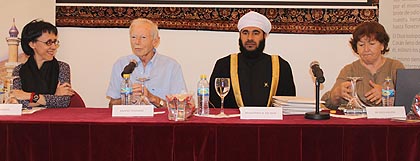
The exhibition was officially opened by Dr. Balbino Povedano Ortega, Vice President of the Fundación Paradigma Córdoba, who welcomed the distinguished speakers, guests and visitors. Dr. Povedano is responsible for the promotion of intercultural and inter-religious dialogue, and this exhibition on religious tolerance at the Bailío Palace is the first event in the cycle entitled "Más Culturas," meaning "diverse cultures."
Dr. María Jesús Viguera, Cultural Director of the Foundation, explained the purpose of the Foundation and the Living Library of Andalusia and introduced each of the members of the speaker's panel, with a resumé of their publications and achievements and short biography.
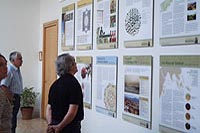
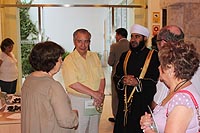
Dr. Mohammed Al Mamari, representing the Minister of Awqaf and Religious Affairs spoke next, and his remarks were translated simultaneously by Dr. Viguera. Excerpts from his speech:
“In this historical city of Córdoba, which has greatly contributed to human civilization, there is a renewed ideology of coexistence. Córdoba was the cradle and refuge of some of the foremost scholars of human thought in various disciplines and a place where Arab Muslims, Christians and Jews lived peacefully together in a unique human model that made this city the center of the world’s religions and the main focus of cultural influence in the Middle Ages.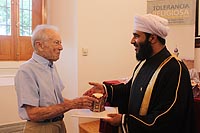
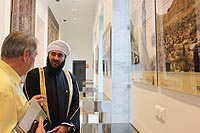
“Between Muscat, the capital of Oman, and the city of Córdoba there is a commonality that not everyone knows, a touch of civilization that has endured a long time, since each of the two cities was home to adherents of the Ibadhi doctrine, the doctrine founded by Imam Jabir ibn Zayd in the year 711. Some adherents of the Ibadhi doctrine came to Andalusia in the 10th C., lived here and founded their own schools which had a strong presence, and were followed by successive movements of migration and settlement of Ibadhis in Andalusia.”
Dr. Viguera's own remarks followed. She said that she can see from the books which the Ministry of Awqaf has presented to the Biblioteca Viva that Oman has as much spiritual beauty as it does physical beauty, and that Oman combines its own ancient history with the history of Islam. Nowadays Oman is a modern nation state with an economy fueled by oil and gas production, which has allowed the development of a modern infrastructure as per the vision of HM Sultan Qaboos, and is being done responsibly and with respect to tradition.
Dr. Amelia Sanchís Vidal, a professor of ecclesiastic law at the University of Córdoba, commended the Paradigm Foundation of Córdoba for its good work, and was especially grateful to the Ministry of Awqaf and Religious Affairs for this eye-opening exhibition. She said "it was especially nice to get to know something about the Sultanate of Oman and nice to have some surprises, to learn things you did not know and did not expect." She then took the opportunity to introduce the FORO DE CÓRDOBA promoting intercultural dialogue. The inaugural conference (2013) will be a forum on multiculturalism, pluriculturalism and religions, with emphasis on the legal status of religions in society; the relationship of individuals, states and religious beliefs; and the role of feminism in religions and society.